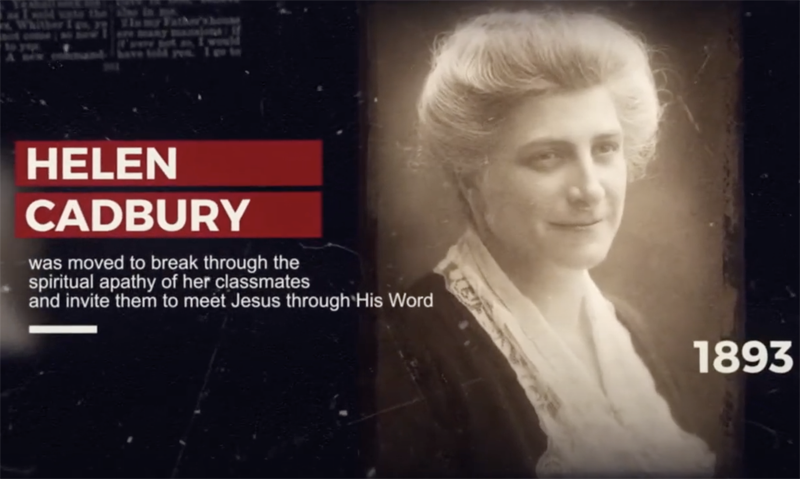By Charles Gardner — 
“Taste and see that the Lord is good” (Psalm 34:8) might well apply to a brand of chocolate that has blessed the world for almost two centuries. And even Israel has benefited from Cadbury’s, as I shall explain.
For some reason (perhaps the proximity of Easter and the chocolate eggs they produce), Cadbury’s was the theme of last Sunday’s Songs of Praise, a popular weekly BBC TV programme that draws millions of viewers.
Quaker brothers George and Richard Cadbury made a mint from their confectionery delights. But their Christian faith was the real focus of their lives, and it showed through their lavish generosity to their employees, reflected in the words or the Lord Jesus that “it is more blessed to give than to receive” (Acts 20:35).
Their hearts burned with their love for the Savior, so they created ideal conditions for their workers with a specially designed garden village within sight of the factory in Bournville, on the outskirts of Birmingham.
The working classes of the Victorian era had become used to city living in cramped and unsanitary conditions, but here was a veritable heaven on earth with beautiful homes, complete with spacious gardens and surrounded by leafy parks and leisure facilities – still said to be among the most desirable residential areas in the country. Of course, there were obvious business benefits from having a contented workforce living in a pleasant environment.
The Cadburys weren’t just businessmen; they were social reformers in the spirit of other Christians like William Wilberforce and Lord Shaftesbury whose faith was their chief motivation.
They even built a magnificent Orthodox church for Serbian refugees from World War II who came to work for them.
So where did such benevolence and generosity come from?
In the words of the Apostle Paul, “Christ’s love compels us” to show this kind of concern for others. “And he died for all, that those who live should no longer live for themselves but for him who died for them and was raised again… So from now on we regard no-one from a worldly point of view… Therefore, if anyone is in Christ, he is a new creation; the old has gone, the new has come!” (2 Corinthians 5:14-17)
Another factor was clearly related to the mercy of God in allowing Gentiles to partake of God’s great plan of salvation through the partial blindness of Israel.
For it was in this context that we are urged no longer to conform to the pattern of this world, but have our minds renewed by God’s Spirit (Romans 12:1f). Something the Cadburys clearly understood.
As I said, Israel also benefited from this extraordinary family. Richard Cadbury actually died in Jerusalem, leaving both a spiritual and financial legacy.
It was on a tour of the Middle East in 1899 that he contracted diphtheria in Egypt and was cared for by the Church’s Ministry among Jewish people (CMJ) in the hospital they had built on Prophets Street.
Despite not surviving the illness, Richard was hugely impressed by the work of CMJ and a hospital ward was subsequently named after him. But after Jewish residents began building their own hospitals, the premises became an educational centre now known as the Anglican International School teaching pupils from some 50 different nations.
Richard’s 22-year-old daughter Helen, who accompanied him on the tour, later married American singing-evangelist Charles Alexander and went on to develop the Pocket Testament League into a global enterprise, borne of a childhood vision to share the gospel at school by sewing pockets into dresses so she and her friends could carry their New Testament.
Helen died, aged 92, in 1969. And inscribed on her gravestone is the Bible reference Romans 1:16 – “I am not ashamed of the gospel of Christ: for it is the power of God unto salvation to everyone that believeth; to the Jew first, and also to the Greek.”

Virtually all the big chocolate companies were founded by Christians. Most of them were practicing Quakers, much persecuted for their faith in days gone by as their exuberance and passion literally shook the foundations of formal religion. At times they would tremble with emotion as they worshipped – hence their nickname.
They co-operated, rather than competed, with their rivals – Fry’s, Rowntree’s and Terry’s. Honesty and integrity was their watchword in dealing with others, and the welfare of their workers, and of the community in general, was always at the heart of what they did.
Rowntree’s, for example, were among the first to offer paid holidays and a company pension scheme. As well as focusing on business, John Cadbury (Richard’s father) also invested his energies in campaigning against industrial pollution, child labour and animal cruelty, co-founding (with Wilberforce) the RSPCA (Royal Society for the Protection of Cruelty to Animals).
In addition, prayer meetings were held for all workers. What a contrast to the selfishness of today’s industrial scene riddled with strikes and disharmony.
God’s ways may be the new ‘blasphemy’ in our politically correct world, but it was radical Christianity that brought the social reforms that so blessed our nation. And there is no other way to rebuild our crumbling Judeo-Christian foundations and reverse the curse for turning our backs on God’s commandments (Deuteronomy 11:26-28).
We owe the ‘Chocolate Christians’ a tremendous debt for their fearlessness and faithfulness in literally putting Christianity to work!



